
Marvel's Guardians of the Galaxy Review
I have to admit that, going into Guardians of the Galaxy, I was nervous. After spending the good part of last year getting excited about it, Marvel’s Avengers burned me and continues to do so with lacklustre content additions and the woes of an “always-online” experience. Despite its many issues, I was still fond of its single-player campaign, and I always thought it would have worked a ton better if it had focused on that, rather than worrying about being a money-generating online hub.
Marvel’s Guardians of the Galaxy proves this. Even with some shortcomings, it manages to tell a story that is worthy of the characters, delivers on some light RPG elements, and has a satisfying semi-tactical combat system. More than anything, it’s so endearing and full of heart that it’s hard to think of any of its issues as more than minor. It’s flarking great.
Although the character designs might have you thinking that this Guardians of the Galaxy is inspired by the MCU, that couldn’t be further from the truth. Marvel’s Guardians of the Galaxy is a completely original story with iterations of the characters that are much more in line with the comics. If you’re coming off the MCU - and chances are high that you are - then they’re going to seem completely different.
Peter is less of a narcissistic scut-peddler and instead cares massively for his team and wears his emotions on his sleeve. Drax still takes things literally, but it’s not the only element of his personality. Gamora is a much more open character who makes bad puns when killing enemies and openly talks about her mental health. Rocket is arguably the closest to his MCU self, but he’s also a bit deeper than what we saw there. Oh, and Groot? He is Groot.
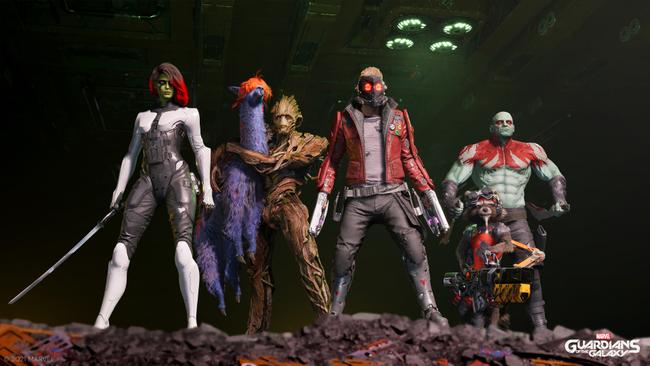
Thankfully, the difference in personalities works here, because the characters and story are by far the highlight of the whole game. Getting into what happens would be revealing too much, but the main mystery and plot thread is gripping throughout and the characters all develop and evolve in surprising ways. If you need a basic summary, it’s essentially how the Guardians fall from one mistake into another and eventually find themselves as the only people capable of saving the universe. Most importantly, Eidos Montreal nailed how the team interacts with each other and how they really are a band of misfits that only barely get along, but somehow work perfectly together.
What’s especially interesting about this take on the Guardians is that it takes place an unidentified amount of time into the team being together. Nearly everyone already has an established relationship with the rest of the cast and the game doesn’t waste time trying to establish why the team is together. You still get backstories, but it doesn’t feel like a retread of what’s happened in the MCU. Instead, this is a world where a lot of important stuff has already happened - Richard Ryder is missing, Thanos has been killed by Drax, and Yondu has been imprisoned.
It would have been easy for Eidos to just retell the team’s origins, or do a big Thanos-based story, but that’s not the case here. Instead, it focuses on lesser-known characters like Kor-Ell, Cosmo, and Adam Warlock, which makes it more interesting for both newcomers and long-time fans of the characters. Even when there are characters that appear in both, like Mantis, they’re done in a completely different way. I’m definitely more invested in this version of the team than I am with the MCU iteration.
The only issue I had with the story is that there are a few straight chapters early on in the game where Rocket acts incredibly selfishly and aggressively towards Quill and the rest of the team. Rocket is known for being a loud-mouth, but he’s making light of dead civilians and generally making everything a lot more difficult than it needs to be. He does eventually get a really good character arc later on, but there was a time where it felt like every character had been done justice but him.
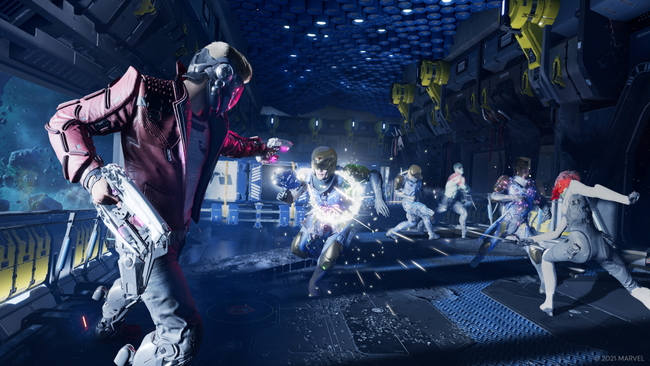
Although I think Eidos has nailed the personalities and dynamics of the Guardians, it can occasionally be a bit too spot-on. None of the characters can go five seconds without talking, and in longer play sessions it can be a bit grating. It’s purposeful and true to the characters but I can recognise that not everyone wants a million quips a minute. At least there’s a decent amount of variety in what’s being said, with the team reacting to what’s happening in the story at the time.
Speaking of being loud, it wouldn’t really be Guardians of the Galaxy without a killer soundtrack and that’s been done justice too. There are tons of 80s classics like “Wake Me Up Before You Go-Go” and “Don’t Worry Be Happy” and they’re used in ways that don’t feel too forced, like being on the Jukebox in the ship or coming out for a special attack. It’s not too in your face. The original music made for the fictitious Star-Lord band is also pretty great, which is something I wasn’t expecting.
I previously joked about the character designs looking similar to the movies, but really, every element of Guardians’ presentation is great. I love the little tweaks made to the characters to make them more distinct, like Rocket’s braided beard, and all of the models look unsurprisingly fantastic. That goes for pretty much every part of the game really - it looks fantastic, but after the visual tour-de-force that was Marvel’s Avengers, it’s not really much of a surprise.
Another problem is that Guardians is unfortunately quite glitchy. I had to restart checkpoints several times because of enemies not registering as dead, or because certain prompts didn’t pop up. It can feel like the game needed just one or two more months to be fully polished, but thankfully it’s never bad enough to stop the fun altogether.
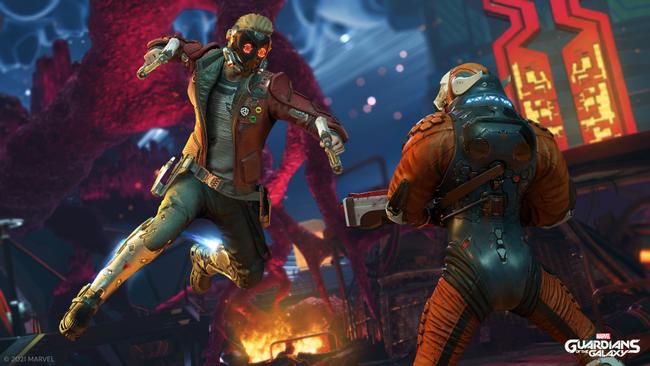
At its core, Guardians of the Galaxy is a third-person action-adventure (emphasis on the adventure) with some light tactical elements and RPG elements. Although it doesn’t really do anything too unique, what it does do feels responsive, satisfying, and fun whilst carrying you through the story.
Although Marvel’s Avengers saw you being able to control the whole team, Guardians of the Galaxy has you only controlling Star-Lord, both in combat and when exploring. Quill mostly uses his blasters, which makes this more of a third-person shooter affair. You can still punch, but it’s honestly better to stay back and blast your way through.
What makes things interesting here is the introduction of some light tactical elements. As the leader of the team, you can issue commands such as telling Groot to hold enemies down or asking Gamora to finish them off with a powerful strike. It’s not too deep, mostly focusing on cooldown timers that barely feel like they’re there at all, but it spices things up and feels fitting for a game focusing on a team.
I usually don’t care about difficulty in games thanks to how many I play and mostly just wanting to be able to cross them off, but Guardians felt incredibly easy. Once you’ve figured out a few ways to combine your team’s moves, it becomes a bit of a joke on the standard difficulty. I think I died once throughout the whole 20-hour adventure and I’m pretty sure it was so I could go back and collect something. Thankfully, the responsive controls and constant flashy feedback make combat feel good to play, but it becomes a little less engaging than it could be since it’s such a cakewalk.
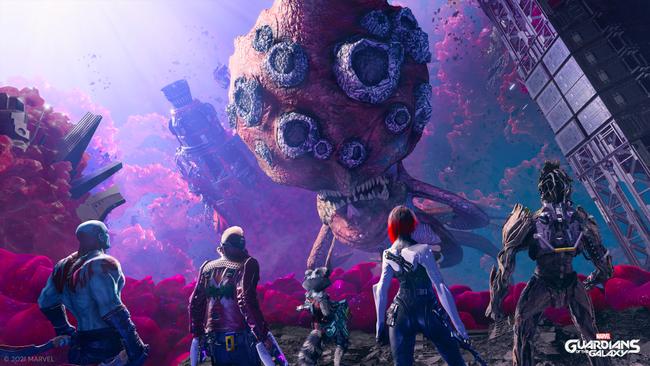
When you’re not in combat, you’ll be exploring linear levels and performing light platforming challenges and puzzles. I liked the fact that you’re still commanding your team outside of combat to complete these levels, as it helps reinforce the overarching team focus, but the exploring sections are far from deep. Once again, platforming and puzzling feel good to do, despite their simplicity. I was especially a fan of the rocket boots and how the double jump feels to perform, which is sort of hard to explain, but you’ll know what I mean if you play.
For those interested in Guardians of the Galaxy’s RPG elements, I’m sad to say that they’re not really that fleshed out. This shouldn’t be too much of a surprise considering that Eidos Montreal said as much before release, but considering what site you’re reading this on it’s worth mentioning. It really comes down to two elements - skill trees and dialogue choices.
The skill trees (no, I don't mean Groot) are incredibly slim with each character getting two additional moves you can purchase with skill points and one special story-unlockable one. That’s about it and I really can’t see any way where you wouldn’t get enough skill points to unlock everything, which makes it feel a bit arbitrary.
Thankfully, dialogue choices actually feel like a natural fit here and help flesh the game out. At many moments throughout the campaign, the player is given the option to respond to what characters are saying and shape the conversation. When it’s during gameplay it’s mostly just flavour text that has no effect beyond a few different lines, but when making decisions during cutscenes it can change little things here and there. Sometimes these consequences are as small as being charged a different amount of money for choosing to hide some tools from the Nova Corps over a space llama, whilst sometimes choices made can change how a whole level plays out.
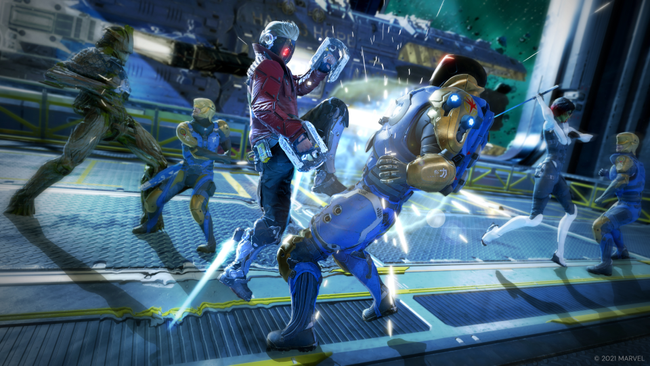
One example of this is when you choose whether to sell Rocket or Groot to Lady Hellbender. Trying to sell Rocket will fail no matter what and result in a bank heist mission that’s full of combat, whilst selling Groot actually works, netting you the money you need and resulting in stealth breakout of everyone’s favourite tree. Lady Hellbender is still mad no matter what you do, but seeing any sort of change makes it feel worthwhile.
Those moments are pretty rare, however. You’ll always be experiencing the same story beats, but you’ll find little differences here and there. Overall, it may not be up to the standard of actual RPGs, but it makes the adventure feel a bit more engaging throughout, and the game is certainly stronger for it.
Alongside being able to (occasionally) make choices that shape the story, Guardians of the Galaxy also borrows the Mass Effect-style crew conversations, although once again it feels like they’re a lite version. Certain chapters will take place on the Guardians’ ship, the Milano, and allow you to talk to the other crew members by finding certain collectibles during missions. These conversations don’t really seem to shape much, and there’s no crew trust meter or anything like that, but they do flesh out the story a lot by explaining smaller character traits and backstories.
All of these elements combine to create a game that is a jack of all trades, and master of none, but that’s a happy outcome considering how many different things it tries to do. A lot of what I’ve described so far probably sounds like a mashup of several different things that other games arguably do better, but Marvel’s Guardians of the Galaxy does everything with so much heart and charm that it overcomes some of the elements feeling a little empty and results in one of the best gaming adventures I’ve been on in 2021. Considering how much of a let-down the previous big Marvel game was, I am more than happy to shout how great this is without any conditions put on top.